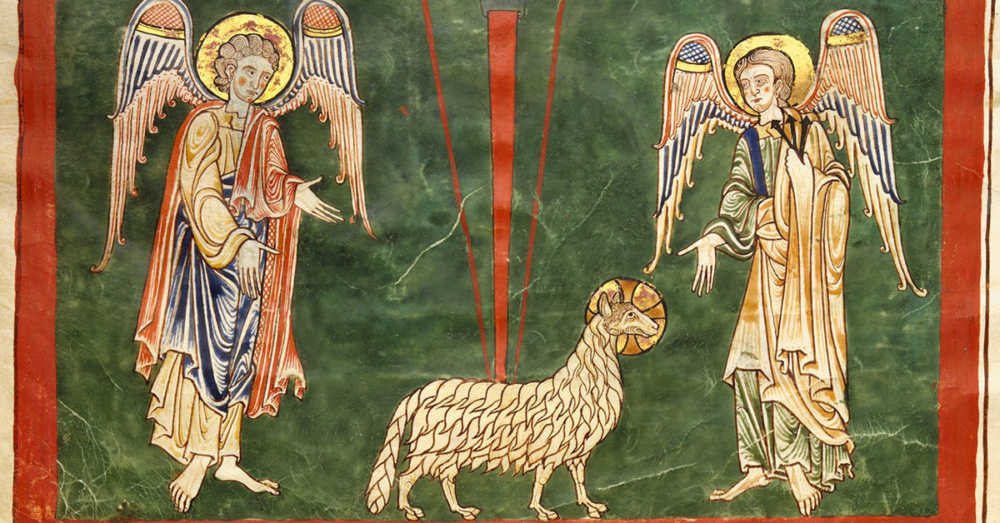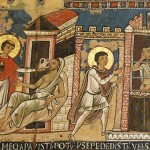We run our website the way we wished the whole internet worked: we provide high quality original content with no ads. We are funded solely by your direct support. Please consider supporting this project.

What Is God’s Glory?
In John 12 we find a view of God’s glory that challenges many modern notions of what the glory of God means. In this passage, we find that Jesus was “troubled” by the cross that lay ahead to such an extent that he wanted to cry out, “Father, save me.” But Jesus quickly expresses his resolve to go forward by saying, “No, it was for this very reason that I have come to this hour.” Then, with a view towards his crucifixion, Jesus exclaims: “Father, glorify your name,” at which point the voice of the Father thunders from the sky: “I have gloried it, and will glorify it again.” Jesus then goes on to declare: “when I am lifted up from the earth, I will draw all people to myself.” And just to make sure readers did not miss the point, John adds: “He said this to show the kind of death he was going to die” (12:27-8, 31-3).
This passage unambiguously identifies Jesus’ crucifixion as the “hour” when he will “glorify” the Father’s “name.” In ancient Jewish culture, to speak of a person’s “name” was to speak about their character and reputation. So, Jesus and the Father are both indicating that the Father’s character would most clearly shine forth—be “glorified”—when Jesus was crucified. While Jesus reflects the Father’s cruciform character throughout his ministry, the Father is “most glorified through the…‘lifting-up’… of the Son,” as Andrew Moody notes. Similarly, Gary Burge observes that, while God was of course glorified in Jesus’ miracles, it is only “on the cross that the mysterious, unfathomable glory of God is to be found.”
Colin Gunton argued that “[The glory of Christ is] lived up on the cross, and only through the trial of death is elevated to the glory that is reigning with the Father… if it is true that those who have seen him have seen the Father, then it is the Father who is revealed in the incarnate humanity of this man glorified through humbling.”
On top of this, Jesus tells us that it was “for this very reason” that he came into the world. As N.T. Wright puts it, the supreme glorification of the Father on the cross was “the climax and purpose of his whole work.” For, as Wright goes on to note, “in being thus ‘lifted up’…Jesus will draw all people to himself. How could it not be so, if indeed his cross is the true revelation of the true God, and if what we see in that revelation is the face of love?”
Now, if the crucifixion is the “climax and purpose of Jesus’ work,” we should understand everything else Jesus taught and did from this vantage point. To put it differently, since the cross was the supreme glorification of the Father, then the many other lesser ways Jesus glorified the Father should be understood as anticipating, and pointing toward, this event.
Let’s think about this another way. If Jesus is the center to which all Scripture points, then the cruciform glory of God that was supremely revealed on the cross must be regarded as the epicenter of this center. On this note, it’s significant that, when the resurrected Jesus “explained… all Scriptures concerning himself” to the disciples on the road to Emmaus, it was primarily to demonstrate that “the Messiah [had] to suffer these things,” which the disciples themselves had witnessed (Lk 24:26-7). And later, when Jesus “opened” the “minds” of the apostles “so they could understand the Scriptures,” it was primarily so they could see that it declared that “[t]he Messiah will suffer and rise from the dead on the third day” (vv.45-6).
What a strange glory!
—Adapted from Cross Vision, pages 37-38
Category: General
Tags: Character of God, Cross Vision, Crucifixion, Crucifixion of the Warrior God, Cruciform Theology, Glory
Related Reading

The Call to a Cruciform Life
Jesus repeatedly taught that following him meant that one had to be willing to “pick up their cross daily and follow [him]” (Lk 9:23; 14:27). Picking up our cross is the centerpiece of following Jesus because this was the centerpiece of what Jesus was all about. The thematic centrality of the cross is also illustrated…

Podcast: Overflow Episode 1 — Dust, Flashlights, and Heathens
Dan and Brianna tackle some tough questions: —Is it okay for Christians to be cremated? —How can we preach from the OT with authority? —What should a Christian academic know in a secular school? http://traffic.libsyn.com/askgregboyd/Episode_0320_overflow_1.mp3

Does Jesus’ Abandonment on the Cross Destroy the Trinity?
In my previous blog I argued that Jesus’ experience of God-forsakenness on the cross was genuine and that, as a matter of fact, there was a genuine abandonment of Jesus by the Father on the cross. In fact, I am convinced that a good deal of our theology hangs in the balance on our affirming…

Podcast: Isn’t God Withdrawing the SAME as Him Personally Punishing and Causing Violence?
Greg discusses whether the passivity of withdrawal is distinguishable from active punishment. http://traffic.libsyn.com/askgregboyd/Episode_0186.mp3

Isn’t the Resurrection the Ultimate Revelation of God? (podcast)
Greg considers the relationship between Christ’s death and resurrection. http://traffic.libsyn.com/askgregboyd/Episode_0744.mp3

Jesus Repudiates OT Commands on Oath-Taking: A Response to Paul Copan (#9)
In his critique of Crucifixion of the Warrior God (CWG), Paul Copan argues that “Boyd pushes too hard to make Jesus’ teaching appear more revolutionary than it really is” [italics original]. Whereas I argue that Jesus repudiates aspects of the Old Testament (OT), Copan argues that Jesus merely repudiates wrong applications of the OT, not…
